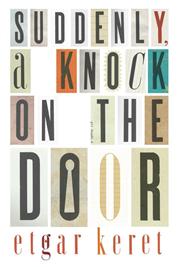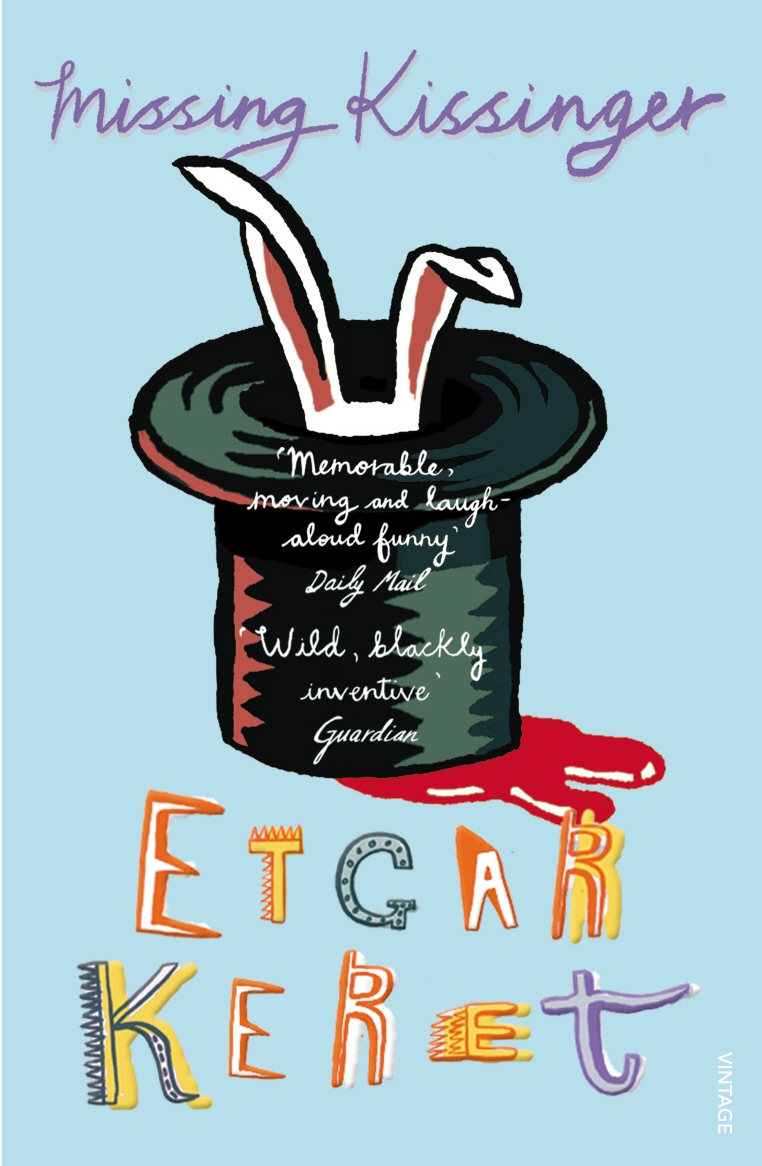
photo by Sanja Gjenero
by Angela Readman
In 2010 I read my first Etgar Keret collection and noticed something in the air. Magic. Everywhere. All around the world writers are doing very strange things indeed. And in theory, I shouldn’t have liked it. The stories we have a history with define who we think we are as readers. I’ve been a Raymond Carver sort. Annie Proulx. I have a list. This is what I like, I thought. Literary. Serious. Big. And then, there was Keret. It made me wonder what I want from a story but won’t admit.
Character, theme, all the usual suspects were on my reader check list. Then, I discovered something not on the list: enjoyment. I want to be entertained. How did I not realise this? It’s pretty basic stuff. But the criteria I apply to movies — not only, ‘Are they good?’ but, ‘Are they fun?’ — wasn’t something I  considered about stories. I love stories, but reading I sometimes thought ‘I may learn something. I don’t have to get a kick out of it’. I sometimes read what I thought I should. Enjoying Keret made me consider the element of enjoyment. It’s important. I can click a story open the way I click a video of a fox on a trampoline. If I don’t enjoy something, I close a window. I demand more of a story than ever before. No wonder the time’s right for magic.
considered about stories. I love stories, but reading I sometimes thought ‘I may learn something. I don’t have to get a kick out of it’. I sometimes read what I thought I should. Enjoying Keret made me consider the element of enjoyment. It’s important. I can click a story open the way I click a video of a fox on a trampoline. If I don’t enjoy something, I close a window. I demand more of a story than ever before. No wonder the time’s right for magic.
During World War II cinema attendance was at an all time high; audiences enjoyed not only realist movies but escapist films, musicals and comedies. I can relate. I discovered a love of magical stories at a time of recession. Newspapers were depressing. The world had a lot on its mind; there was no better time for talking fish. Keret knows he writes stories people need right now. It’s not an accident that Suddenly, a Knock on the Door, Keret’s new collection, starts with ordinary people: a pizza delivery guy holds a gun to the writer’s head to make him tell a story. He is not satisfied with the story the writer begins, a story which starts with the reality of what is happening – a knock at the door. The response of his characters reveals a great deal about Keret’s understanding of his readers needs.
That’s an eyewitness report. It’s exactly what’s happening here right now. Exactly what we’re trying to get away from. Don’t you go and dump reality on us like a rubbish truck. Use your imagination, man, create, invent, take it all away.
Keret gives his readers escape and something real. In the midst of Keret’s glorious lies is truth. David Gaffney’s article on Keret, Get Shorty – The Microfiction of Etgar Keret, captures the theme of the story ‘Drops’ – loneliness. I’m a reader who responds to this, but it’s not enough to please me alone. If the subject had been presented differently, I might have been so keen to read it in 2010 – not right now. Give me a break. Have you read today’s paper? What I want as a reader seems to change with the times. I had to ask, What do I want now?
What have you got?
Talking Fish, the Moon on a Stick and Weird Shit
I want fun and I want something serious.
I want something light and something heavy.
I want something to relate to and I want escape.
I want joy, but tell a happy ending I can’t believe and I’ll baulk.
A tall order? Maybe. I’m a reader. I want the moon on a stick. Give me something beautiful, but don’t let it weigh me down.
Cue Keret. Serious themes in his work engage – loneliness, relationships, loss, politics, race and war. ‘What, of this Goldfish, Would you Wish?’ is a story that does what it says on the tin, and more. In the story, a documentary maker knocks on people’s doors and asks what wishes they would make to a talking fish. The responses are poignant.
…if he ever found a talking goldfish he wouldn’t ask of it a single thing. He’d just stick it on a shelf in a big glass jar and talk to him all day, it didn’t matter about what. Maybe sports, maybe politics, whatever a goldfish was interested in chatting about.
There’s a sad truth in the story about city life, immigration and loneliness I can relate to as a reader, but I don’t have to be too bogged down by it if I don’t want to be. There’s a talking goldfish to look at after all.
Likewise, ‘Hat Trick’ (from Missing Kissenger) – a story about a magician – seems to go beyond its setting of children’s parties. It ends with the narrator feeling ‘like someone was trying to tell us this isn’t the best time for rabbits, or for babies either. That this isn’t the right time for magicians’.
Thousands of writers have read ‘Hat Trick’ and thought: ‘Yes! That’s what it’s like being a writer’. Parents and teachers and students have read the exact same lines and felt the same. Keret’s stories start as surreal little envelopes then open up our world. They mean something to us, but we don’t feel intimidated when reading them. A magic top hat? We can handle that; our feelings about the economy, changing values or the future don’t have to feel too real.
 Now that I think about it, every story I read more than once has one thing in common: the ‘Yes Factor’. Something in the work provokes a ‘yes’ response in my gut. If it sounds visceral that’s because it is – reading should be a pleasure, a thrill, a shot in the arm. We accept good writing can make us weep or inspire us, but we don’t often wonder if reading is a joyous act. Maybe we should. If you never feel joy as a reader you aren’t doing it right – try something new. Joy isn’t trivial.
Now that I think about it, every story I read more than once has one thing in common: the ‘Yes Factor’. Something in the work provokes a ‘yes’ response in my gut. If it sounds visceral that’s because it is – reading should be a pleasure, a thrill, a shot in the arm. We accept good writing can make us weep or inspire us, but we don’t often wonder if reading is a joyous act. Maybe we should. If you never feel joy as a reader you aren’t doing it right – try something new. Joy isn’t trivial.
A story evolves much like a friendship, I think. We make friends by shared laughter, or discovering something in common – be it music, Monster Munch, or love or hatred of Russell Brand. In the same way, a story develops from something I respect, or it sees casually into something I have feelings for. If great short stories feel like a part of us, it’s no accident – parts of us are in there.
What exactly is the ‘Yes Factor’?
How many stories have you never had more than a casual relationship with, even though you’ve been told they are brilliant? You aren’t stupid. It isn’t necessarily that you didn’t get it – your ‘yes’ button just wasn’t hit. It lies elsewhere. Not this writer. Not this story. Not today – though who knows how you’ll feel in a few years.
The ‘Yes Factor’ differs for everyone – if it didn’t, we wouldn’t need many writers: we’d all buy the same books every year and some people would be very rich. There’s more to my own ‘yes’ response than an intellectual checklist… Is it well written? Can I see it? Do I understand? I want to get a buzz off a story. Good writers include sound, smell and taste to engage readers; we get little treats. This is something I respond to positively. A story can be clever, but only my head knows this, my gut wants something else. I must identify emotionally, but my senses must feel included. Clever stories can turn me off if no one has a sandwich or smells something weird. My own ‘yes’ response is ordinary. It doesn’t just live in my head. It needs stuff so all of me can get on board.
Keret has the ‘Yes Factor’. One story that gets me is ‘Fatso’. It isn’t just the fun ride of the narrator’s girlfriend becoming a fat guy every night that I love, though I love that ride – I get vicarious steak and beer – but the story also somehow feels like me. Have I started relationships as one thing, then evolved beyond romance into someone who can drink beer from a can and burp through zombie movies? Didn’t me and my partner just learn to hang out? Hell yeah, we did!
In discovering joy in the crazy world of Keret, I changed as a reader. I gained an awareness of what triggers my ‘yes’ response in other fiction – and noticed it again in authors like Adam Marek, Nik Perring and Murakami. In magical stories I get my kicks when I find serious themes, identification and very ordinary details within weird scenarios. But in other genres, I get this same joy from what I can only describe as ‘weird shit’. It’s not ideas that trigger my joy, though I enjoy thinking about them later; it’s the odd little bit. I’d never acknowledged this before, but if the world is reading stories about talking fish, I can admit I like weird shit. I get a ‘yes!’ feeling – the joy of recognition that things are like that, people are weird.
So, what’s ‘weird shit’? A lot of stuff, don’t get me started… But in stories, for me, it’s a quick detour; the unexpected things people do or think. It’s not stunning description I quote to friends, though I admire it, but the weird line – a glimpse. The description of the narrator’s father in ‘World Champion’ does it for me every time:
In honour of my dad’s fiftieth birthday I bought him a gold navel cleaner […] My dad was in a good mood all evening, the life of the party. He showed everyone how he brushes his navel clean, and made sounds like a happy elephant.
There’s a wonderful glimpse of life in these lines. The act of cleaning a belly button shows a great deal about the character. He has no airs and graces. He seems easy going. I picture a middle aged man with a round belly, and, yes, I think of elephants in a story that has nothing to do with elephants. I  picture what a happy elephant might look like and it’s a joy. Yet, the inclusion of the elephant is more than weird for the sake of it; it serves a crucial function. By associating the character with such a pleasant escapist image the reader is instantly on this guy’s side. I get a ‘yes’ response. And, in the same way I talked about Burger King and foot massages after Pulp Fiction, this strange/ordinary shit in a story is the stuff I tell people who don’t study stories, and they smile.
picture what a happy elephant might look like and it’s a joy. Yet, the inclusion of the elephant is more than weird for the sake of it; it serves a crucial function. By associating the character with such a pleasant escapist image the reader is instantly on this guy’s side. I get a ‘yes’ response. And, in the same way I talked about Burger King and foot massages after Pulp Fiction, this strange/ordinary shit in a story is the stuff I tell people who don’t study stories, and they smile.
This new awareness of what I really like, as opposed to what I know I should appreciate, I gained by reading Etgar Keret. Somehow his stories revived a readerly joy I haven’t acknowledged since I was small (no wonder – I was reading about talking bears way before I read Hemingway.) It may sound trivial or stupid, but that’s what I want when I read sometimes – highs en route to thinking about deeper meaning. It’s not something we talk about much, the weird bits we love, the sheer joy – I suspect because it doesn’t sound very worthy. We want to appear to be serious readers and read what we should. This is all well and good, but reading should give us a buzz sometimes too. I recommend Keret, but mostly I recommend getting in touch with those small things in fiction that have the ‘Yes Factor’ for you.
If we ourselves are writers, developing an awareness of tiny moments in stories that give us joy is worth trying. It may make us better writers, and, while we’re at it we may – dare we say it – have fun.


Angela
I read Keret’s ‘Suddenly, A Knock at the Door’ last year and agree with your observations about his talent at smuggling truths among the glorious lies, stark reality amongst fantasy. I reviewed the collection for Contrary Magazine and, from a slightly different perspective came to a similar conclusion about the joys of saying ‘yes’ to a story: http://blog.contrarymagazine.com/2012/07/review-suddenly-a-knock-on-the-door/
Hi Pauline, Great review. Thanks for sharing it- I haven’t read Gaza Blues, but I’m inspired to after reading your review. There’s something quite addictive about magical stories i think! I know some people who won’t read them, assuming they are flippant. They’re missing out on so so much